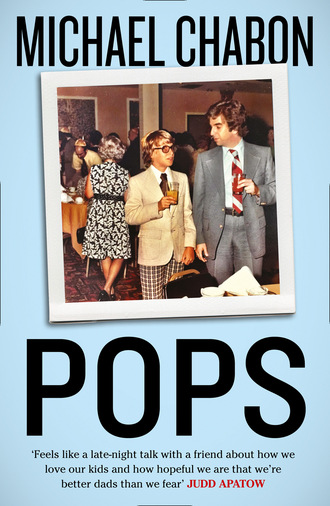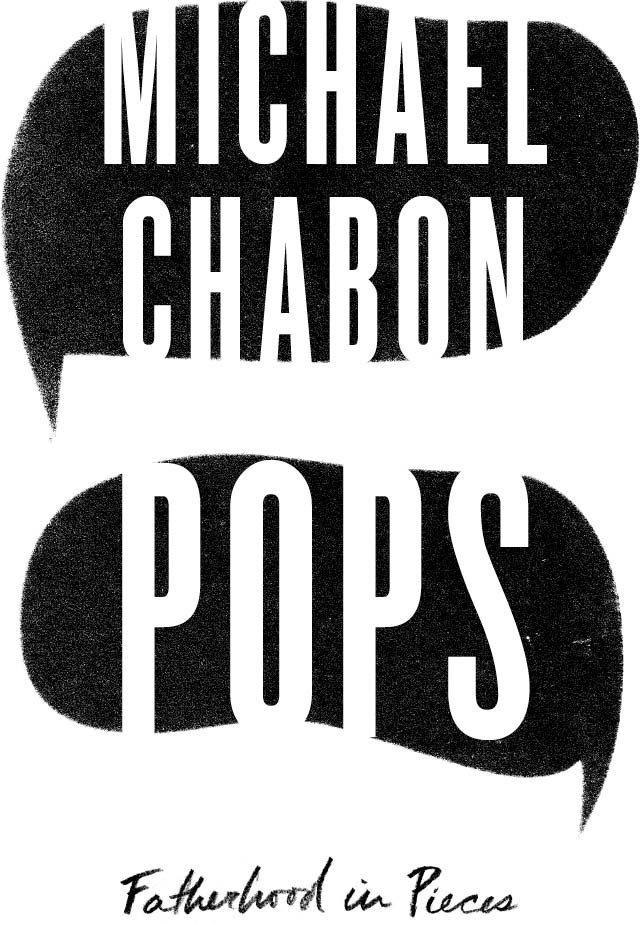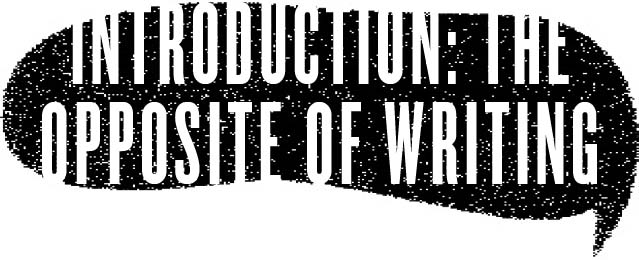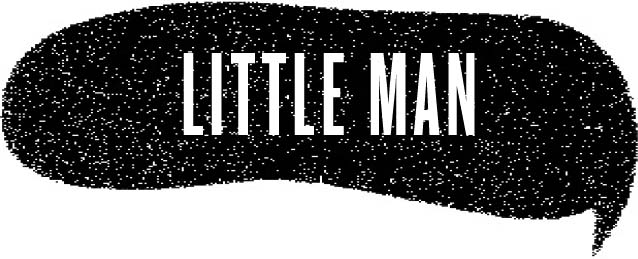
Полная версия
Pops: Fatherhood in Pieces



Copyright
4th Estate
An imprint of HarperCollinsPublishers
1 London Bridge Street
London SE1 9GF
www.4thEstate.co.uk
This eBook first published in Great Britain by 4th Estate in 2018
Copyright © Michael Chabon 2018
Cover design by Oliver Munday
Cover photograph courtesy of the author
Michael Chabon asserts the moral right to be identified as the author of this work
“Little Man” was originally published in GQ under the title “My Son, the Prince of Fashion.” “Adventures in Euphemism” was originally published on atlantic.com, under the title “The Unspeakable, in Its Jammies.” “The Bubble People” (under the title “One of Us”), “Against Dickitude,” “The Old Ball Game,” and “Be Cool or Be Cast Out” were originally published in Details.
A catalogue record for this book is available from the British Library
All rights reserved under International and Pan-American Copyright Conventions. By payment of the required fees, you have been granted the non-exclusive, non-transferable right to access and read the text of this e-book on-screen. No part of this text may be reproduced, transmitted, down-loaded, decompiled, reverse engineered, or stored in or introduced into any information storage and retrieval system, in any form or by any means, whether electronic or mechanical, now known or hereinafter invented, without the express written permission of HarperCollins
Source ISBN: 9780008286293
Ebook Edition © May 2018 ISBN: 9780008286309
Version: 2019-05-03
Dedication
To my father, and to my children
Epigraph
I’ve been there and back
And I know how far it is
—RONNIE LANE
Contents
Cover
Title Page
Copyright
Dedication
Epigraph
Introduction: The Opposite of Writing
Little Man
Adventures in Euphemism
The Bubble People
Against Dickitude
The Old Ball Game
Be Cool or Be Cast Out
Pops
Footnotes
About the Author
Also by Michael Chabon
About the Publisher

At a literary party the summer before my first novel was published, I found myself alone with a writer I admired, on the deck of our hosts’ house along the Truckee River. People came and went with blue Mexican wineglasses and bottles of beer, but I sensed that, for whatever reason, I had the man’s attention.
“I’m going to give you some advice,” he told me, a warning edge in his voice.
I said I would appreciate that. I was curious to hear what he had to say, not because I felt in need of advice but as a clue to the mystery of the great man himself. He presented a smooth surface without chinks or toeholds, the studied amiability of someone unaccustomed to giving himself away. Advice might be the only clue I was going to get.
The great man said that his advice was going to be painful—or maybe that was just in his tone—but he knew what he was talking about, and if I wanted to make a go of it as a novelist, I would do well to pay attention. The guy was nearly twice my age, but he was not old. He was young enough, for example, to wear black Chuck Taylors. He was young enough to smile ironically at himself, laying the Polonius routine on some raw hurler of metaphors out of UC Irvine.
“Don’t have children,” he said. “That’s it. Do not.” The smile faded, but its ghost lingered a moment in his blue eyes. “That is the whole of the law.”
I was due to marry my future ex-wife in under a month; my book would come out the following spring. It turned out that this conjunction of circumstances, in the view of the famous writer, was cause for alarm. Now, marriage was fine—in fact, all of the guy’s books were dedicated to his long-suffering wife—but if you were not careful, you would run a serious risk of damaging your career. After this one, he patiently explained, there would be a second novel to write, and second novels were notoriously thornier and more unwieldy than debuts. Following the inevitable sophomore cock-up, if I were lucky and stubborn in the proper measure, I would go on to tackle the magisterial third and fourth novels, and then the quirky fifth, the slim and elegant sixth, the seventh that, in some way, would recapitulate and ring the changes on all its predecessors, and so on, for as long as my stubbornness and luck held out. Unless, of course, I made the fatal mistake of so many would-be young hotshots before me.
“You can write great books,” the great man continued. “Or you can have kids. It’s up to you.”
I nodded, reeling a little at the prophecy he had just laid down for me, a career of struggle and triumph stacked up to the heavens like Babel, book by torturous book.
“I never thought about it that way,” I confessed. My future ex-wife and I had gotten as far as the usual drawing up of rotisserie-league baby-name rosters, but no further. Did I need to put an immediate halt to these playful conversations, along with any more earnest ones that might arise? She was a poet, with ambitions of her own.
“Poe,” he said. “O’Connor. Welty. None of them had children.” This was a list that, by implication, included him; he was a Southerner himself, and he and his beloved dedicatee were childless, too. “Chekhov. Beckett. Woolf.”
I tried to muster some counterexamples, but alas, the one who came immediately to mind was my current idol, John Cheever, packed into a house in Ossining with his aggrieved wife and three children. I had just been reading the memoirs of his daughter, Susan. Her childhood had been quietly calamitous, her father’s career a farrago of alcoholism, shame, and secret homosexuality. The short stories had over time come unbuttoned, the novels proceeding with the sham dignity and slow gait of drunks trying to pass for sober, while the children alternated between hoping desperately to be seen and trying to keep out of the way. It was at least arguable, I guessed, that the man ought never to have had children at all. I wondered how Susan Cheever would feel about that proposition.
“Put it this way, Michael,” the great man said, and then he sketched out the brutal logic: Writing was a practice. The more you wrote, the better a writer you became, and the more books you produced. Excellence plus productivity, that was the formula for sustained success, and time was the coefficient of both. Children, the great man said, were notorious thieves of time. Then there was the question of subject matter, settings, experiences; books were hungry things, and if you stayed too long in any one place, they would consume everything and everyone around you. You needed to keep moving, always onward, a literary Masai driving your ravenous herd of novels. Travel, therefore, was a must, and I should take his word for it, because he had made a careful study: Traveling with children was the world’s biggest pain in the ass. Anyway, writers were restless folk. They could not thrive without being able to pick up and go, wherever and whenever it suited them. Writers needed to be irresponsible, ultimately, to everything but the writing, free of commitments to everything but the daily word count. Children, by contrast, needed stability, consistency, routine, and above all, commitment. In short, he was saying, children are the opposite of writing.
“Thomas Mann?” I tried. I had been racking my brain to think of a great writer who was a family man but not calamitously so, like Cheever. My enthusiasm for Mann had faded of late, but I would never forget the rapture of the summer I had spent, five years earlier, climbing The Magic Mountain.
“Thomas Mann?” the great man said. He grinned; I had walked right into his trap. “Thomas Mann used to lock himself in his room! Every day! For hours! His children were forbidden to disturb him, on pain of death, and that’s barely an exaggeration. His children were a disturbance to him. When he was working, they were a source of pain. I mean, forget the question of getting your work done, is that the kind of father you want to be?”
That was an easy one to answer. I knew, without ever having discussed it with my future ex-wife or anyone, the kind of father I wanted to be. Unlike my own father, I would be around for my children whenever they needed me, over breakfast, doing homework, when they learned to swim, to cook, to ride a bicycle; when they cried into their pillows. I would be present in my children’s lives. In short, my door would always be open to them. Until now it had never occurred to me that this ambition might be incompatible with the practice of writing.
“Richard Yates,” said the great man, preparing to deliver the tercio de muerte, like one of Hemingway’s matadors. “You know what Richard Yates said?”
Oh, no, I thought. I revered the bleak and gimlet-eyed Yates, for Easter Parade and Revolutionary Road and Eleven Kinds of Loneliness; no way was this going to be anything but grim.
“‘You lose a book,’” the great man quoted, or paraphrased, or possibly invented himself, “‘for every child.’”
Now the great man smiled. He could see the effect that his words were having on me as I stood there trying to reckon how many books I stood, or would stand, to lose. My future ex-wife and I had settled on two names, one male, one female. This suggested a worst case of two books, two books erased, wiped away by the universal solvent of children. I supposed I could live with that. But what if, after the first two, there was an “accident,” too much wine in the afternoon, a failure of birth control; and what if, God forbid, that third pregnancy turned out to be twins? Suddenly, in my imagination, I was clinging to the base of that half-built Babel, up to my ankles in a roiling surf of babies and brats, the non-author of an entire shelf of great novels I would never be able to write, any one of them conceivably my masterpiece.
“All right, Michael, you think about it,” said the great man in that accent like butter on a warm biscuit. His work was done. He patted me on the shoulder, rattled the last half-inch of Dos Equis in his bottle, and went back inside the house, confident of having saved—or at least of having frightened—another lost lamb.
I have a vague recollection of reporting this conversation afterward to my future ex-wife, and of our laughing it off as arrogant self-justification or, perhaps, more pitiably, making virtue of necessity. We got married, moved a few times, got divorced. I managed to snatch a handful of gently farbisn short stories out of that Gilliganesque pleasure cruise, though the second novel I attempted to build and launch over the course of those years, a would-be epic, sank like a vast unseaworthy dreadnought, unsalvageable, to the bottom of my soul. Fortunately, there were no children to blame for that shipwreck. A couple of years later I married again, and over the quarter century that has followed, while fathering four children, I’ve managed to turn out fourteen books.
Should there be eighteen?
Is the creative wistfulness that sometimes comes over me after a rough night at the keyboard, that feeling of having somehow wandered by mistake into the wrong book, a kind of mourning for the loss of those other, phantom-limb novels, the ones that my children stole? It’s certainly the case that if one were to plot on a graph my declining output of short stories over the past two decades alongside my rising output of children, the resulting X would seem to mark the scene of a crime. But the reason I almost never write short stories anymore isn’t that my children are time thieves. It’s that my children are expensive, and short stories just don’t pay very well. I can’t afford to write short stories anymore.
And those four “lost” novels predicted by the great man’s theory all those years ago? (Setting aside for the moment the question of whether you can lose something you never had, and the fact that going around telling people “You lose a book for every child” sounds like exactly the kind of romantically unromantic self-pity you would expect from the full-blown raging alcoholic that Richard Yates had apparently become by the end of his life.)
If I had followed the great man’s advice and never burdened myself with the gift of my children, or if I had never written any novels at all, in the long run the result would have been the same as the result will be for me here, having made the choice I made: I will die; and the world in its violence and serenity will roll on, through the endless indifference of space; and it will take only one hundred of its circuits around the sun to turn the six of us, who loved each other, to dust, and consign to oblivion all but a scant few of the thousands upon thousands of novels and short stories written and published during our lifetimes. If none of my books turns out to be among that bright remnant because I allowed my children to steal my time, narrow my compass, and curtail my freedom, I’m all right with that. Once they’re written, my books, unlike my children, hold no wonder for me; no mystery resides in them. Unlike my children, my books are cruelly unforgiving of my weaknesses, failings, and flaws of character. Most of all, my books, unlike my children, do not love me back. Anyway, if, one hundred years hence, those books lie moldering and forgotten, I’ll never know. That’s the problem, in the end, with putting all your chips on posterity: You never stick around long enough to enjoy it.

Конец ознакомительного фрагмента.
Текст предоставлен ООО «ЛитРес».
Прочитайте эту книгу целиком, купив полную легальную версию на ЛитРес.
Безопасно оплатить книгу можно банковской картой Visa, MasterCard, Maestro, со счета мобильного телефона, с платежного терминала, в салоне МТС или Связной, через PayPal, WebMoney, Яндекс.Деньги, QIWI Кошелек, бонусными картами или другим удобным Вам способом.

